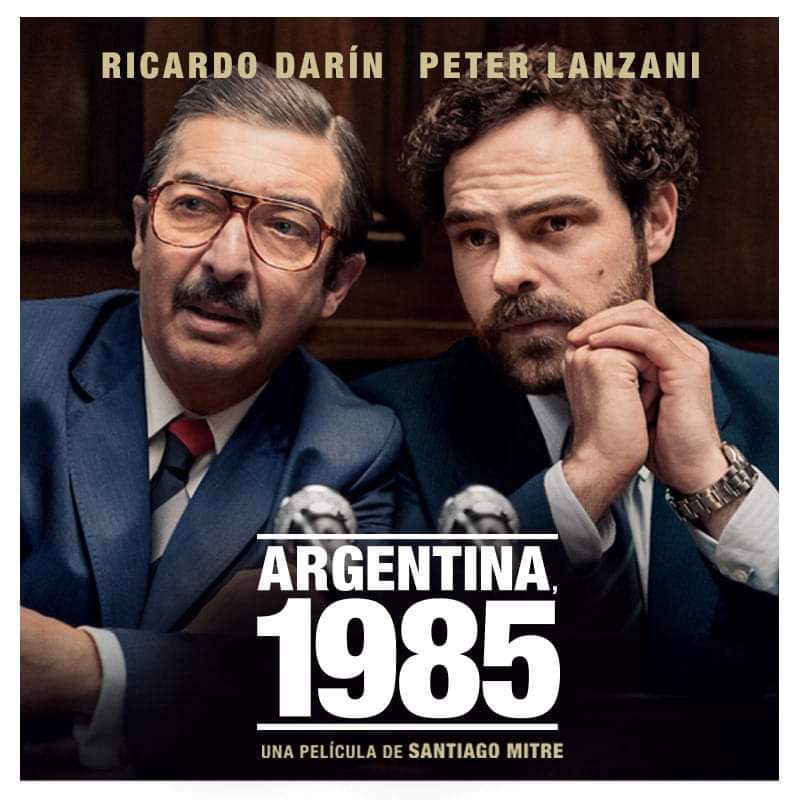“ARGENTINA 1985” film by director Santiago Mitre, will soon be released in streaming worldwide.
“Argentina 1985” is not only just one more film about a specific trial, but it also offers the chance of spreading to a wider audience and indeed also to a younger one, an extraordinary and unique event in universal history. Audience that maybe is not aware of some of these facts.
What makes this unique is that until 1985 no country had had the chance to bring into trial its own dictators and to do so before a Civil Court.
I want to re-emphasize the importance of this phrase so that the reader takes due note of it.
Until then, no country had had the chance to bring into trial its own dictators and to do so before a Civil Court.
The trial brought the opportunity to judge, with a large amount of evidence and wide defenses, 9 high military who until a short time ago, disposed of the power of life and death over the entire population.
In the 1970s, Argentina suffered a terrible and chaotic time in which armed groups believed they were above the law and allegedly intended to fight on behalf of the citizens in order to achieve a more just status.
These armed groups passed onto action arguing that the democratic system was corrupt and unfair. They made use of violence in the name of an entelechy called “people” which never chose them for it, feeling as the enlightened that would sacrifice themselves for those poor of understanding. The weak democratic government back then ordered the armed forces the annihilation of these groups.
Due to that order, the military understood they could carry out their task without accountability of any kind and commanded an absolutely ruthless and inhumane Coup d’État.
In what was a Regime of terror, paramilitary groups kidnapped people with unrestrained use of force. The kidnapped were transferred to clandestine detention centers on the floor or trunk of a car, blindfolded, beaten, terrified and immobilized.
In these centers there were turns for torture, isolation, aberrant situations of beatings and mistreatment, all in subhuman conditions.
In many cases, torture and detention procedure ended with the “vanishing” of the once abducted. “Vanished” (Desaparecidos in Spanish) became a new status, until then yet had not been described in any Regime of humanity.
The non-recognition by the State of the disappearance of these persons along with the denial of their existence or of their kidnapping, the impossibility of knowing what became of them and what was their fate as well as of their remains, was characteristic of this era.
In many cases, the assets of the desaparecidos were plundered, dispossessed. And vice versa, on certain occasions the State used that apparatus to obtain economic benefits, terrorizing businessmen so as they take certain decisions or cede some belongings to those who were protected by the rulers.
This procedure was also used to strip off the identity of around 500 babies, born in the illegitimate captivity of their mothers and handed over to accomplices or also to the same representatives. Almost 40 years after the end of that hell less than 150 have recovered their identity.
In 1982 the military government which aimed to remain in power, sought for popular support by resorting to an old argentines’ desire: the recovery of the Malvinas Islands, named Falklands by the British.
That madness, that will remain for another analysis, was the beginning of the end of the nightmare.
Since October 1983 we finally embraced democracy, uninterruptedly and forever. At that time President Alfonsín decided submit to trial those who had given orders and those who had exceeded compliance, carrying out unthinked and against humanity acts.
To accomplish that there was no need in changing laws but only to add a compulsory Civil instance to Military Courts.
“Military justice is to Justice what military music is to Music” was already an old phrase then, so it was foreseeable that addenda would not bring social peace.
Civilian judges, faced by the lack of action of Military Courts, devoted themselves to the task of Justice and decided to carry on a historic trial.
I was a 20 years old second-year law student at that time and knew I had to attend at least once to that historical milestone, similar to the Nuremberg trials.
From the bleachers of Court I listened to the requisition to the judges by the Prosecutor Julio César Strassera, it was the same claim Argentine society still continues to do: “Never Again!”
I listened to the pronouncement of this verdict on my last day of studying Criminal Law, and I felt it almost as a play of fate telling me that Simon Wiesenthal was right in saying that we should always seek for “Justice, not Revenge.”
Dr. Ariel Gelblung
Simon Wiesenthal Center`s
Director for Latin America


Ariel, tu artículo es excelente. Saludos desde Rosario, Argentina.